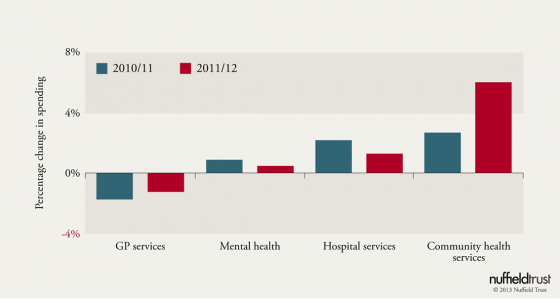The Budget 2013 confirms that funding for health in England will be frozen in real terms for a further year – up to 2015-16 – and the requirement to under-spend allocations is here to stay. The Government has also extended the one per cent cap on pay awards for a further year and is talking about limiting pay progression.
This is hard for NHS workers but will be a big help to NHS organisations trying to match the money with the pressures on services.
After 2015-16 the Office for Budget Responsibility’s economic and fiscal forecast offers little prospect of an improvement in the funding outlook. If anything the question now is: can a future Government realistically protect the NHS from any further public spending cuts?
Vince Cable and others have begun to question the wisdom of protecting services such as health from further rounds of cuts.
So it really does look like the NHS is facing the decade of austerity we talked about in our report on funding and pressures in December 2012. Can the NHS maintain services against this bleak financial outlook?
Pay restraint makes a big difference. John Appleby at The King's Fund recently published a review of the drivers of health and social care spending. Although politicians and policy makers often talk about the impact of an ageing population, in the NHS (and across Europe) increases in the cost of care has been one of the key contributors to health taking an ever increasing share of GDP.
Pay restraint is being used in almost all countries to limit health spending as part of deficit reduction plans. It’s a really important short-term measure but it doesn’t constitute a strategy.
At our recent Health Policy Summit speakers from the International Monetary Fund and the Organisation for Economic Co-operation and Development (OECD) affirmed that across the globe we are wrestling not just with a major economic crisis but also a longer term challenge of fiscal sustainability and health is a key part of that.
The challenge is not to get through four or five difficult years and then everything returns to normal but rather to try to deliver a step change in the productivity of health services. So beyond the current pay policy we need a productivity plan.
Although the NHS is living within the budget and delivering headline savings, recent reports don’t paint a very encouraging picture on productivity. Both the National Audit Office and Health Select Committee have raised concerns about the amount of genuine efficiency gain being delivered within the headline savings reported by the Department of Health.
Both criticise the Department of Health for not being sufficiently focused on transformative change. Our recent report on spending and productivity in the NHS explored this in more detail and confirms the worries expressed by the Health Committee. Measuring productivity is difficult and we have used a relatively crude indicator of acute hospitals labour productivity.
But with almost 50 per cent of the reported QIPP savings in 2011/12 coming from the acute sector we might have expected to see a significant improvement in labour productivity. Looking at 110 acute trusts across England we found workforce costs and activity moving in line with each other leaving labour productivity unchanged.
The Department of Health has put much emphasis on local QIPP plans to deliver efficiency improvement. Local action is clearly essential but it is not clear if local action will be enough. Many people have questioned whether local action will deliver the system reconfiguration which commentators consider essential.
Reconfiguration discussions often focus on changes to the acute sector, particularly mergers and the concentration of specialist services on fewer providers. Our analysis suggests we also need to pay closer attention to the state of primary care.
The chart below shows the real terms change in spending on different services over the last two years. Spending on GP services fell in real terms.

Click on the image above to access an audio slideshow in which Anita outlines patterns of NHS spending from 2003 to 2012.
The Health and Social Care Act focused on primary care’s role in commissioning services but if we are to deliver a step change in the productivity of the NHS we need to look at primary care’s role as the front-line provider of health care.
Without an effective primary care service with the capacity and skills to support patients with chronic health conditions and the frail elderly more effectively it’s difficult to see how the NHS can manage with such a long period of constrained funding. Many of the levers to reform primary care are held nationally by the NHS Commissioning Board (now NHS England).
If the lost decade is not to be a wasted decade we need the NHS Commissioning Board to have a plan for primary care and we need it urgently.
Suggested citation
Charlesworth A (2013) ‘The lost decade’. Nuffield Trust comment, 27 March 2013. https://www.nuffieldtrust.org.uk/news-item/the-lost-decade
